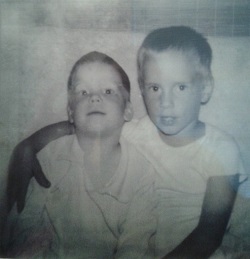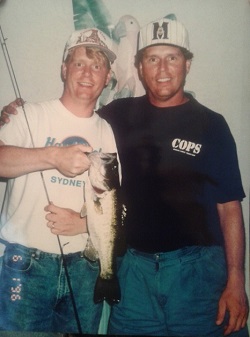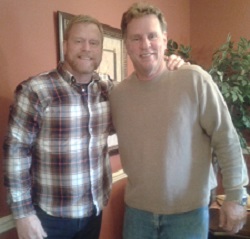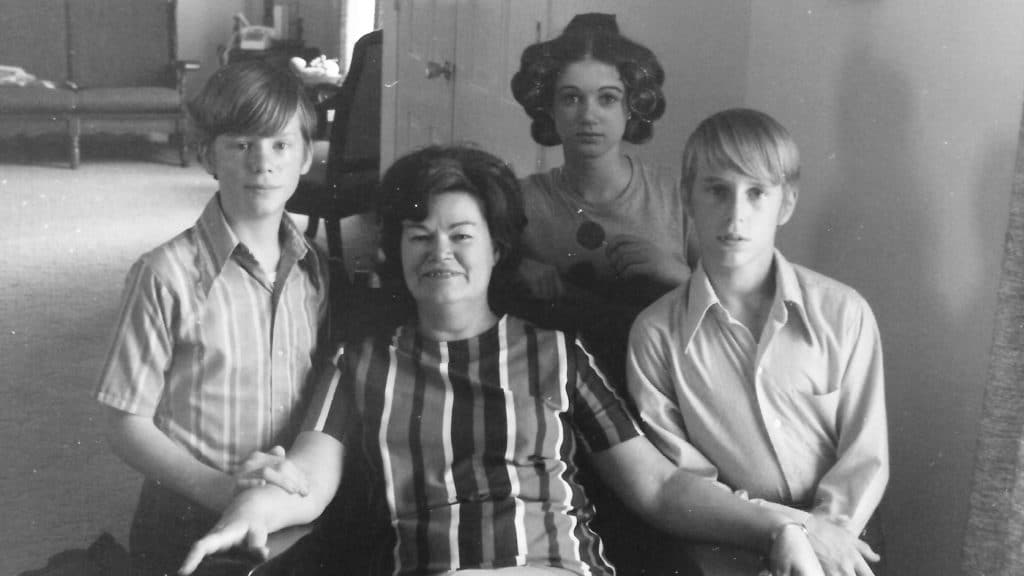“Remember when Billy Perry gave you a black eye?” David asked me. He stood on a ladder with a screwdriver in his hand. I was holding up Mom’s new light fixture while David attached it to the ceiling. We took on the project during a visit I made back home a few weeks ago.
 “Of course I remember, David.” My response had the weary, patronizing tone I reserve for my older brother.
“Of course I remember, David.” My response had the weary, patronizing tone I reserve for my older brother.
I’ve been speaking to him that way since we were kids, I suppose. The strategy is to act like I’m completely bored with him so, if he tries to make fun of me, it will look like I don’t care. I always thought I needed the mechanism, since I came of age as a pimply-faced pansy who was an easy target. That, as opposed to David, who was only one year older and a blond, blue-eyed star athlete. No one ever believed we were brothers.
“So what do you remember, then?” he asked.
I rolled my eyes. “I was eight or nine,” I began. “Billy and I were goofing around in the back yard, and I pissed him off somehow and he punched me right in the eye.” My arms were getting tired from holding up the fixture and I shifted my feet.
“That’s all?” he asked, still focused on his work. “Stop moving.”
“Pretty much. I went inside and I was upset –”
“You were crying, man,” he corrected. He laughed under his breath.
“I was very upset. Mom was getting me ice and stuff. So after a while, Billy rang the bell and Mom made me come to the door so he could give some fake apology. Billy’s mom obviously made him do it. I’m sure he loved seeing how bad my black eye looked.”
“And that’s all you remember? Seriously?”
I wasn’t enjoying reminiscing about Billy Perry. “Yes, David. That’s all that happened.”
“No, it’s not,” he said, and he stopped his work to look down at me. “You walked in the house. You were crying. I asked who hit you and you said Billy. So I left and found him down the block and I kicked his ass.”
David watched my jaw drop. “Billy’s mother didn’t tell him to apologize, Mark,” he added. “I did.”
“Oh c’mon, no way,” I replied, a little weakly, feeling something like frustration. How could I not have known this? And besides, this was my black eye story. I’m the one who got punched.
“Hold the light up higher,” David said, and he tugged on the fixture. “Do you even know how many times you would have been beaten up if it wasn’t for me?”
 Recasting David as my protector seemed ludicrous. He was frustrated all the time when we were growing up, unsure how to handle a brother who wasn’t the companion he might have expected. I loved Broadway musical albums. He loved the noisy drum set that dominated our shared bedroom.
Recasting David as my protector seemed ludicrous. He was frustrated all the time when we were growing up, unsure how to handle a brother who wasn’t the companion he might have expected. I loved Broadway musical albums. He loved the noisy drum set that dominated our shared bedroom.
And yet, the most antipathy he could muster was to ridicule me as I made my way through the confusion of gay adolescence. I resented his effortless masculinity and the fact I had to watch this annoyingly handsome straight dude grow up right beside me, reminding me on a daily basis of all I would never be.
My shoulders ached from holding up the fixture but now I barely noticed, too busy trying to get a handle on a lifelong resentment that suddenly wasn’t holding up under close scrutiny.
Brothers fight. But I only got one black eye in my whole life. And it wasn’t from David.
“What do you mean I would have gotten beaten up?” I asked him, finally. “I was so gay those guys were scared to get near me. I freaked them out too much.” I honestly believed that my late 1970’s fashion choices of jumpsuits, platforms and elaborate jewelry kept the straight boys of Bossier City, Louisiana too off balance to bash my face in.
“Mark, I had guys on my football team who wanted to crush you,” David said. “All the time. But they knew I would never let them. That’s how you made it out of high school alive.”
He finished with the installation and stepped down. I finally let go of the fixture and shook the numbness from my arms.
David was changing the narrative of my adolescence and I didn’t like it. I wanted to count him among the high school jocks and hayseeds who taunted me. Those bullies are gone, lost to time or floating around in alumni Facebook groups that I never join. David remains, so he became the default stand-in for the injustices of my youth.
I was sweeping bits of wire and drywall from the room when David spoke up again. “Did you ever think about what it was like for me, Mark? When we were in high school?”
I narrowed my eyes at him, amazed the popular varsity quarterback would dare take any childhood sympathy for himself. “Oh, please, David. Really?” He stood there. “Fine. What was it like for you?” I dripped sarcasm. “How did my struggle coming to terms with my gay identity in a hostile environment affect you, pray tell?”
He considered his words, mentally editing them down to a single remark. “It was just hard, Mark,” he said. “That’s all.”
And somehow, in that moment, my selfishness abated. I allowed the possibility that it could be tough growing up with a gay pride parade float as a brother.
 Once you change the lens, other things come into view. Like the openness of David’s emotions, and his guilelessness when facing our family tragedies. He was the one who said he could never handle it if Dad died, even as our father’s fate was sealed, even as the rest of us had the same thoughts but couldn’t express them.
Once you change the lens, other things come into view. Like the openness of David’s emotions, and his guilelessness when facing our family tragedies. He was the one who said he could never handle it if Dad died, even as our father’s fate was sealed, even as the rest of us had the same thoughts but couldn’t express them.
David tells me he loves me, even if I stare back wordlessly. He asks blunt questions.
“Are you going to die?” David had asked in a crackly long distance phone call nearly thirty years ago, when I told the family I was HIV positive. “Are you sure you’re not going to die?” he repeated. It was what everyone in the family wanted to know, of course, only no one dared to pose the question. It never occurred to David not to. If I had been able to peer over the wall I had constructed between us, I might have loved him for asking.
We are the storytellers of our own lives. We select the bits and pieces to remember, and the truth fades. It becomes lost in the fog of a thousand years.
Mom returned home to the sight of her two youngest sons standing beside their afternoon installation. While I displayed the fixture like I was a model from The Price is Right, David explained the details of his electrical prowess.
“But I vacuumed,” I jumped in. I clicked off my contributions as if they were a checklist for Mom’s affections. “I took all the parts out of the box. I cleaned up the mess. I held the light fixture!”
“You didn’t need to hold the fixture,” David said, and his smile gained wattage. “I just liked seeing you squirm.”
I threw up my arms. “What do you mean? It could have fallen on my head!”
“Not a chance,” David said. “I was actually holding it up at the ceiling.” He punched me in the arm. “I had you the whole time, little brother.”
And with casual amusement and affection, David grinned again.
Mark





